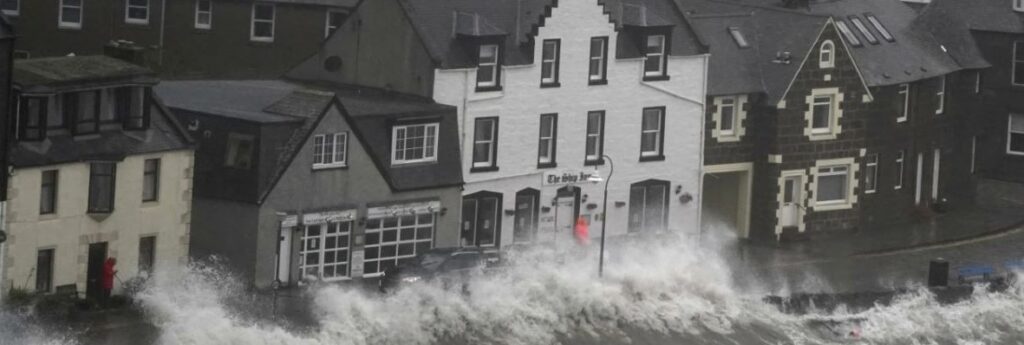The UK’s weather forecaster, the Met Office, issued a rare red alert – the highest level of weather warning – for parts of Scotland, predicting “exceptional rainfall” Thursday and Friday,
as much of northern Europe braced for stormy weather, heavy rain, and gale-force winds from the east.
In Scotland, the storm, named Babet by UK officials, threatened more than a month’s worth of rain in the worst-affected regions with threats of “danger to life from fast-flowing or deep floodwater.” The last red alert in the UK was issued in 2020.
Babet already brought floods and swollen rivers that swamped several towns and villages in Ireland, with some areas remaining under water and without power Thursday. Soldiers helped with evacuation measures in the town of Midleton in County Cork, where more than 100 properties were flooded.
In Denmark, residents scrambled to place sandbags along exposed areas. In Assens on the central island of Funen, emergency services deployed huge rubber tubes in the harbour to counter rising water levels, broadcaster TV2 reported. Southern Denmark police urged people along the east coast to leave exposed areas if the weather predictions remain, saying cottages, harbours and other places could be flooded.
TV2 reported that the region would likely see the worst flooding in 110 years, and the Danish Meteorological Institute said waves could reach 4 meters along east-facing coasts.
Copenhagen’s airport and the Danish national rail company warned of cancellations and delays Friday because of bad weather. And several ferry lines between Danish islands were suspended, as were ferries to Rostock in northern Germany and to Oslo.
Swedish meteorologists also issued a warning for the south coast from Friday evening and Saturday. They said that the water level in southern parts of Sweden may reach its highest level since the 1990s.
In Germany, authorities warned of high water in bays in Schleswig-Holstein, south of the Denmark border, until Saturday.
Authorities also warned of high water in the next two days on the Baltic Sea coast of Schleswig-Holstein, Germany’s northernmost state, with water levels of up to 2 meters (6.6 feet) above average possible in the inlet where the city of Flensburg is located. Some ferries to the North Sea islands of Foehr and Amrum were delayed or cancelled, German news agency dpa reported.
Norwegian meteorologists said a strong low-pressure area over Great Britain combined with high pressure over northern Scandinavia was creating strong winds, with “very strong gusts” expected to hit southern Norway from the east.
Parts of southern Europe were also affected by heavy rains.
Stormy weather battered much of Spain, leading to ferry cancellations from the southwestern ports of Algeciras and Tarifa to Tangier in Morocco and the closure of public parks in several cities, including Madrid.
The stormy weather, expected to worsen Friday in several regions, comes after the hottest and driest first two weeks of October on record. Spain had been experiencing a severe drought for nearly two years.

